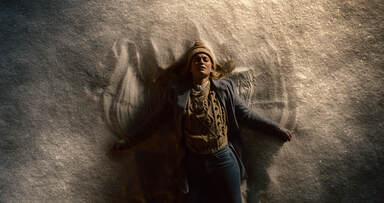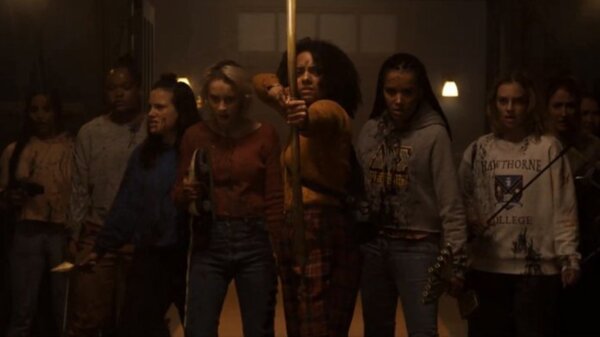 It’s been one hellish sleigh ride, but we’re finally here on the release day for the second Black Christmas remake. Controversy has followed this film from conception to now. It’s experienced just about every possible toxic backlash from fans, from worry over its PG-13 rating to frustrations over heavy handed (though important) messaging... ...I’ve been one of the those championing the film’s aim to reach out to young girls and usher them into the horror genre with a slasher film made specifically for them. And as much as I wanted to love it for that, this one just wasn’t for me. The second remake of Bob Clark’s classic Black Christmas, this latest rendition comes from talented director Sophia Takal (New Year, New You), with a script by Takal and April Wolfe. Taking over as our lead is Imogen Poots, playing Riley, a hardened sorority girl with a history of sexual abuse, attending a school that leans heavily into ideas of male superiority. Over Christmas break, Riley and a few other house sisters find themselves stalked by a masked killer, leading to the discovery of a terrible conspiracy targeting the women of Hawthorne college. Black Christmas states its intent clearly from the beginning, opening with a quote from Calvin Hawthorne, the founder of the school our heroines attend, Hawthorne College, decrying that women are essentially subservient to men. The load of bullshit that that statement is from Mr. Hawthorne, it’s a mindset that runs rampant at the school, with Cary Elwes stepping into a more sinister role as the incredibly sexist Professor Gelson, who has it out for Riley and her sorority sisters, in particular, Kris (Aleyse Shannon), for their demands that he be fired, and for their successful attempts to remove a bust of Calvin Hawthorne from school halls. After one stylized death of a young woman on campus facing a cloaked killer who can move around like a damn Christmas spirit, able to vanish and appear in impossible places just moments later, we meet Riley, head-strong Kris and the rest of the sisters, including Marty (Lily Donoghue) and Jesse (Brittany O’Grady). These are girls who love and support each other. Just as the men have their symbols of empowerment like the bust, so do the girls, as we see in a moment where Riley hands an extremely nervous Helena (Madeleine Adams) a comb which she says has been passed down through her family (it hasn’t) and gives her good luck. Much has been made about Black Christmas’ feminist approach, yet I would argue Takal and Wolfe aren’t hammering a message over the audience’s head too harshly during this first half, and instead paint a realistic world that showcases the all-too real fears and adversities which women face. We learn Riley was raped by a worshipped male student, Brian (Ryan McIntrye), a case in which the authorities took Brian’s side. We use horror to talk about the atrocities of the world and find catharsis, and Black Christmas includes some highly satisfying moments of exactly that. Through the first half, I didn’t mind the political narrative of Black Christmas, because what Riley goes through is something awful that happens to a lot of women, and Poots does her damndest to make you want to jump out of your seat and cheer for Riley when she finds the strength to stand up to her attackers. But Black Christmas is a tale of two halves. One, a cup of hot cocoa on a snowy, Christmas morning, the other, a heavy lump of burning coal threatening to rip through your stocking. Despite what you think you saw in the trailers, the film actually progresses similarly to Clark’s original. Instead of phone calls, Black Christmas takes a sillier, modern approach of the killer harassing our heroines through DMs from a Calvin Hawthorne account. Girls disappear at the sorority house, and Riley is on a mission to find them, ignored by campus security accusing her of over-worrying and baselessly attacking the male students she thinks are involved. Like the original, the kills are quick and largely bloodless, mostly off-screen, though not nearly as intense. About that last part, I will never condemn a PG-13 horror film for its rating, but when the film was clearly filmed with an R-rating in mind, it never feels right. And those who were worried, were right to worry. Nearly every moment of violence, every grisly reveal, feels cut short, choppy, and altogether mismanaged. A PG-13 rating is not the problem. Butchering a film intended to be something else in order to reach a specific demographic, is. And then, we reach the second half, and what had already begun to feel like an undercooked Christmas cookie turns into an overbaked treat hard as a rock and black as coal. We go from a claustrophobic stalk and slash to an all-out war, ripe with commentary but devoid of the intimate realism established early on. Black Christmas comes from a place of frustration, of wanting to gift women with a rally cry that women should not and will not be suppressed. Its heart is in the right place, but the twists and ideas introduced in the second half of the film get away from Takal and Wolfe and are never reigned back in. It’s like watching two different movies with the same overbearing message. One is an effective remake with a fresh perspective on an old classic. The other is an over-the-top, supernatural horror flick that, in trying to squash the “not all men” narrative, accidentally says, but really though, not all men, accompanied by agenda-driven dialogue so forced and thrown in during inopportune moments that it’s cringe-worthy. This is one of those unfortunate cases where the filmmakers are so much more interested in the message, that they do in fact lose track of what works about the film in the first place. And I hate to say that. Because as ham-fisted as it is, this is a movie not only made to provide women with a tool to face oppression, but with some much-needed reflection for men as well. Many of us have had those defensive breakdowns where we scream and shout “I’m not like other men” at the slightest hint of accusation, and there are moments in Black Christmas that demonstrate just how ugly and misunderstanding that attitude can look. No genre is better for talking about the issues present in society, because it allows us to face those monsters in a safe space. But subtlety is key. And that’s where Black Christmas ultimately fails. Some films wrap their messaging up in a pretty package, whereas Black Christmas is a gift lit on fire and thrown through your window. There’s a problem with your horror film when the best moment is a sick burn of a song insulting frat house d-bags, as epic as that may be. Black Christmas is now slashing through theaters from Blumhouse. By Matt Konopka
0 Comments
Leave a Reply. |
Archives
March 2023
|


 RSS Feed
RSS Feed